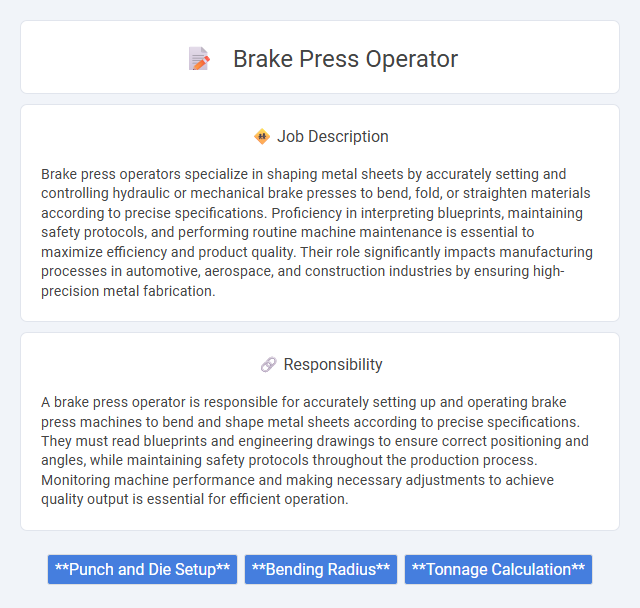
Brake press operators specialize in shaping metal sheets by accurately setting and controlling hydraulic or mechanical brake presses to bend, fold, or straighten materials according to precise specifications. Proficiency in interpreting blueprints, maintaining safety protocols, and performing routine machine maintenance is essential to maximize efficiency and product quality. Their role significantly impacts manufacturing processes in automotive, aerospace, and construction industries by ensuring high-precision metal fabrication.
People with good physical strength and manual dexterity are likely suitable for the Brake Press Operator role due to the job's demands for precise machine handling and repetitive tasks. Those who demonstrate strong attention to detail and the ability to follow safety protocols probably perform well in this position, minimizing operational errors and accidents. Individuals with limited mobility or poor hand-eye coordination might find this job challenging and less appropriate for their capabilities.
Qualification
A Brake Press Operator must possess a high school diploma or equivalent, with specialized training in operating hydraulic and mechanical press brakes. Proficiency in reading blueprints, understanding metal fabrication specifications, and using CNC machinery enhances qualification. Experience in safety protocols, mechanical troubleshooting, and precise material handling is essential for optimal performance in this role.
Responsibility
A brake press operator is responsible for accurately setting up and operating brake press machines to bend and shape metal sheets according to precise specifications. They must read blueprints and engineering drawings to ensure correct positioning and angles, while maintaining safety protocols throughout the production process. Monitoring machine performance and making necessary adjustments to achieve quality output is essential for efficient operation.
Benefit
A brake press operator job likely offers financial stability through competitive wages and potential overtime pay. Benefits may include health insurance, retirement plans, and paid time off, enhancing overall workplace satisfaction. On-the-job training opportunities could increase skill development and future career advancement chances.
Challenge
The role of a brake press operator likely involves managing complex machinery that requires precise control and attention to detail, which could present significant challenges in maintaining consistent output quality. Operators might face difficulties troubleshooting mechanical issues or adjusting settings for varying materials, increasing the demand for technical expertise. The pressure to meet tight production deadlines while ensuring safety protocols are followed may also contribute to the overall challenge of this position.
Career Advancement
Brake press operators gain valuable expertise in precision metal fabrication, opening pathways to supervisory roles or specialized technician positions. Mastery of CNC programming and maintenance can accelerate career growth within manufacturing plants. Certifications in safety and machinery operation further enhance promotion prospects and salary potential.
Key Terms
Punch and Die Setup
Brake press operators specialize in precise punch and die setup to ensure accurate metal bending and forming. Proper alignment and secure mounting of punches and dies are critical for producing high-quality parts and minimizing material waste. Expertise in adjusting tooling parameters boosts efficiency and maintains consistent production standards in manufacturing environments.
Bending Radius
A brake press operator must precisely control the bending radius to ensure accurate metal forming and prevent material damage. The bending radius directly affects the strength and flexibility of the metal part, requiring careful adjustment based on material thickness and type. Mastery of bending radius calculations enhances the quality and durability of fabricated components in manufacturing processes.
Tonnage Calculation
Brake press operators are responsible for accurately calculating the tonnage required to bend specific metal gauges, ensuring the press applies the correct force to avoid material damage. They use precise formulas and reference material properties, thickness, and bend length to determine appropriate tonnage settings. Mastery of tonnage calculation enhances operational efficiency, product quality, and machinery longevity in metal fabrication processes.
 kuljobs.com
kuljobs.com